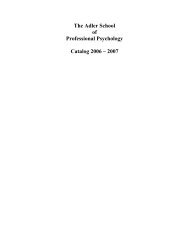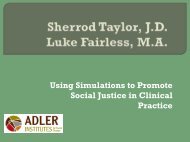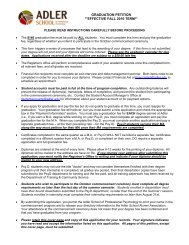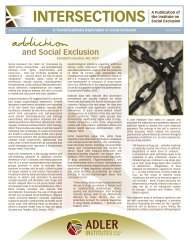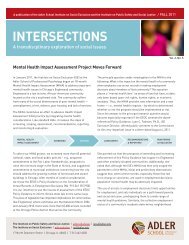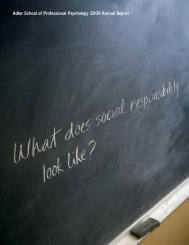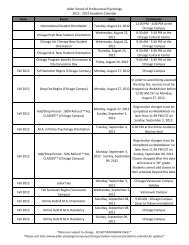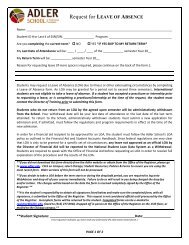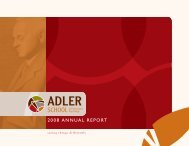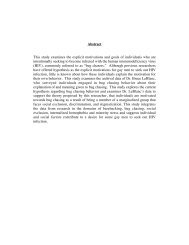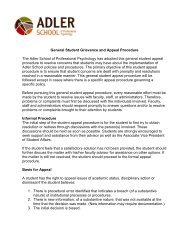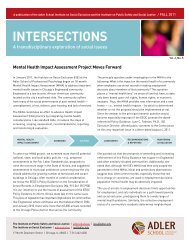Adler School of Professional Psychology Catalog 2008 – 2009
Adler School of Professional Psychology Catalog 2008 – 2009
Adler School of Professional Psychology Catalog 2008 – 2009
You also want an ePaper? Increase the reach of your titles
YUMPU automatically turns print PDFs into web optimized ePapers that Google loves.
involvement in clinical and scholarly activities at pr<strong>of</strong>essional training sites,<br />
including the <strong>School</strong>’s Psychological Services Center, gives students the closely<br />
supervised opportunity to apply and further develop the knowledge, skills,<br />
values, and competencies they gain in course work. Practicum training<br />
requirements begin with a first year Community Service Practicum that focuses<br />
on developing skills related to community-based interventions, advocacy, social<br />
justice, and systemic interventions that benefit human welfare and well-being.<br />
Clinical training provided in students’ second practicum focuses on developing<br />
the competencies needed to prepare students for entry level practice at<br />
graduation. Because the focus is on integrating Master’s level education at <strong>Adler</strong><br />
with Master’s-level supervised clinical training, no transfer credit is granted for<br />
practica credits earned elsewhere. Students must successfully complete course<br />
prerequisites prior to being approved to begin their second practicum.<br />
First year students will spend 8-10 hours per week over the course <strong>of</strong> six<br />
months at an approved Community Service Practicum site while concurrently<br />
enrolled in required coursework. A minimum <strong>of</strong> 200 clock hours is required.<br />
Students are expected to gain the minimum required hours over a six month<br />
period and no less. At least one <strong>of</strong> the following courses must be taken<br />
concurrently with Community Service Practicum I & II: Pr<strong>of</strong>essional<br />
Development, Issues and Ethics (505), Introduction to <strong>Adler</strong>ian <strong>Psychology</strong> and<br />
Psychopathology (402), and/or Social <strong>Psychology</strong> and Individual Differences<br />
(641).<br />
Students are also expected to spend at least two days per week over the<br />
course <strong>of</strong> at least nine months at an approved clinical practicum site (Practicum<br />
I & II) and must concurrently enroll in Practicum Seminars throughout their<br />
field training. A minimum <strong>of</strong> 700 clock hours <strong>of</strong> counseling practica are required.<br />
In addition, prior to completion all M.A.O. students must take a third practicum<br />
placement in business (Practicum III) for a minimum <strong>of</strong> 300 clock hours with a<br />
concurrent business seminar.<br />
M.A. in Police <strong>Psychology</strong> (M.A.P.)<br />
The Master <strong>of</strong> Arts degree in Police <strong>Psychology</strong> is designed for individuals<br />
currently in the field <strong>of</strong> law enforcement. The Program is designed to provide a<br />
theoretical background in clinical and social psychology and learn to apply the<br />
basic principles <strong>of</strong> these disciplines to managerial, field, interpersonal and<br />
organizational concerns that arise within the police environment.<br />
This Master <strong>of</strong> Arts degree is not designed to teach the student to conduct<br />
therapy or engage in psychological testing. There are no clinical hours required<br />
nor a practicum to complete. This degree does not lead to any type <strong>of</strong> licensure<br />
71



